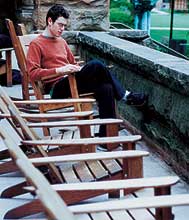
|
| Student Perspective | by David Sernoff '02 |
|
Reflections of a 21st-Century Obie Has
the Oberlin experience
really changed over the decades? |
|
|
My days normally begin when most people are taking their lunches, or are at least contemplating doing so. This isn't because I'm unusually irresponsible, or can't stand mornings. I thank my lucky stars every night for the generous and flexible scheduling options afforded Oberlin students nowadays. I can take all of the courses that interest me or that I need for my major in the afternoon or evening. Lucky me!
So, noon hits, and I'm on my way to brunch. I live in East Hall,
which as alumni from the 1980s on will know is right across the
street from the main dining hall, Stevenson. I've never understood
why college students, even iconoclasts and freethinkers of the Oberlin
mold, gripe automatically about the quality of cafeteria food. Oberlin
food is, frankly, excellent as institutional food goes. Our food
is supplied by the same outfit which supplies Marriott hotels all
over the world, and I've never really had cause to complain.
 So,
I'll find myself lounging tranquilly in one of Stevenson's airy
and tastefully decorated commons by around a quarter after noon
on most days. Cereal, perhaps a sandwich or two, fruit salad, and
pasta is the normal regimen. Our school's cafeteria culture is probably
as far from normative as is any other aspect of Oberlin's social
life. Cliques of students don't "own" corners of the cafeteria or
particular tables, as is often the case at many schools. Sure, some
students tend to sit in the same places day after day, but this
is more due to force of habit than any sense of obligation. I'm
often joined by perfect strangers for meals, and our pick-up conversations
can range from musings over academic duty and sleeplessness to the
profound. Oberlin's friendly image is indeed borne out in its actual
social climate. So,
I'll find myself lounging tranquilly in one of Stevenson's airy
and tastefully decorated commons by around a quarter after noon
on most days. Cereal, perhaps a sandwich or two, fruit salad, and
pasta is the normal regimen. Our school's cafeteria culture is probably
as far from normative as is any other aspect of Oberlin's social
life. Cliques of students don't "own" corners of the cafeteria or
particular tables, as is often the case at many schools. Sure, some
students tend to sit in the same places day after day, but this
is more due to force of habit than any sense of obligation. I'm
often joined by perfect strangers for meals, and our pick-up conversations
can range from musings over academic duty and sleeplessness to the
profound. Oberlin's friendly image is indeed borne out in its actual
social climate. Much
as I hate finishing a meal, eventually it's time to go to class.
On Mondays, Wednesdays, and Fridays, I go from Classical Greek
Drama in Translation, to Existentialism. On Tuesdays
and Thursdays, Introductory Symbolic Logic and a survey of
Modern Drama occupy my thoughts and time. Yesterday in Existentialism,
we discussed the nature and possibility of romantic love. Not a
quiet class, I assure you! One disillusioned young man commented
to the tune of, "In my opinion, romantic love is essentially the
public relations agent representing the human soul, placing it in
the best possible light." Like most classroom participation, this
wasn't provocation for provocation's sake; the student's jarring
sentiment set off a discussion that carried five minutes over the
end of the period. I'm often late to my next class after Existentialism,
and I don't mind a bit.
That
Oberlin night life leaves much to be desired is a truism as old
as the College itself. The Apollo shows cheap films, the highbrow
among us stay busy with Conservatory performances, but really, work
or self-entertainment is what most Obies are left with. I usually
do a bit of both. And we wonder why Oberlin grads are so likely
to get married: this school is about as perfect an incubator of
true love, or at least sets the stage for its discovery, as there
is. Yet plenty of schools are small and geographically isolated--what
makes Oberlin stand out? The idealism so obvious in Oberlin's politics
and educational philosophy easily extends to the realm of love and
human relationships. Obies seem to follow their hearts with the
same tenacity with which they learn and engage their broader worlds.
Much of this must sound awfully familiar to an Oberlin graduate of any era; at least I hope it does. Why? I'd like to think that much about the Oberlin experience really hasn't changed over the decades. Contemporary concerns and prevailing ambitions do vary by era, and Oberlin is just as influenced by broader social trends as is any other college; we students aren't as aloof from the mainstream as we'd like to think we are, and this sits well with me. I know that what I love about Oberlin has been loved by untold numbers of students earlier. Friendships with professors, having relationships with, and not just knowledge about, the people in my community, a kind of wonderfully contagious optimism so prevalent amongst my fellow students. There just aren't too many places like this. I already miss it. David
Shernoff, a junior at Oberlin, is from Brooklyn,
New York.
|
|